- Home
- Jason McIntyre
Fled (Dovetail Cove, 1973) (Dovetail Cove Series) Page 5
Fled (Dovetail Cove, 1973) (Dovetail Cove Series) Read online
Page 5
It felt like he was under the Pacific, cold water in his ears and blocking out the world. He shifted and his cold foot moved against his grocery bag. He breathed on to the hand that gripped his Colt and relaxed.
The whine of the hinges again. Hank Williams again. Hank was crooning about how all the luck he had was bad and that he’d never get out of this world alive.
Charlie’s mind raced with two competing thoughts. One, that Hank Williams died of the drink and chronic back pain in the back seat of a Cadillac. And two, that the drone of that song went on and on. Someone was standing with the pub’s door open.
Charlie fought the urge to pop his head up and look through the windshield.
Finally, someone spoke. The booming voice brought loud, slurred words: “I’ll see you, you sons of bitches!” It startled Charlie and he gave a little jump.
Then the whine of the hinges came again, drowning old Dead Hank Senior off to a foggy distance before some widely-timed footsteps in slush on the concrete.
Charlie held his breath.
Footsteps got closer to the car, wound around the driver’s side.
“Now, where’re my goddamned keys...?”
A pause.
And then someone tried the handle on the driver’s door. A drawn squawk of the heavy door and then the interior light went on. A rush of cold air but Charlie felt his skin warm with it. Once again, his armpits flushed with flop sweat. It was a shock against the cold. In a brief flash he wondered whether Munn would see the fog on the inside of his car windows, or whether Charlie had been back here long enough to make any. Then he wondered if Munn would see the hump of Charlie’s back as he climbed in.
The shocks tilted the car and the front seat shifted. In flopped Munn. “Gaddammit all to hell,” he said, likely at realizing the keys weren’t in the ignition either. “Left ’em at the bar.”
What is it, Charlie thought, that makes a drunk do all his thinking out loud? His father did it, too, the ol’ bastard. Always making speeches, always giving the play-by-play as if he was calling the World Series.
In one swoop, Charlie popped up behind Munn who had planted himself in the driver’s seat. Charlie’s heart hammered as he drew his Colt up to the man’s neck and said, simply, “I have your keys.”
That came out in a hoarse squeak so he cleared his throat and tried to deepen his voice. “And if you can’t tell, I’m drawin’ on you too. Now—”
He threw Munn’s keys in a jangle on the passenger side at the man’s hip. “You fix to run and I’ll squeeze three rounds into you. I’m a good shot. ’Specially this close.” A lie. The only weapons Charlie’d ever fired were hunting rifles and, so far as he could remember, he usually missed at any kind of distance. But he was telling himself a story now, just as much as he was telling it to Munn. At this distance, anyone would put a hole through a target.
“Mister,” Munn said, panting and then swallowing hard. Charlie could see his round, shockingly white eyes in the rearview. His rising voice was rife with panic. His pitch was shrill. “I don’t know who or what yer after but you got the wrong feller here I ain’t done nothin’—”
Charlie cut him off. His own heart was in his throat but he’d come this far. He wasn’t going to let his nerves overtake this now. Not when the opportunity to dig himself out of his messy hole was so close. “Don’t mean anything to me either way, Mister Munn. Me, I’m nobody. Just here to do a job.” He pressed the point of his gun barrel deeper into Munn’s neck. “Now, you go on ahead there and pick up those keys. You start this car. You flood it and I shoot your left leg off.”
“—Okay okay mister now just take it easy—” More sweaty, panted words from Munn, who was starting to sweat just as much as Charlie.
8.
The Caddy started up fine, Munn’s shaking hands notwithstanding. The heater blew cool air and Charlie told Munn to switch on the defrosters and aim the vents at the windshield. Since he’d been joined in the car, the windows had gone opaque with their breath.
“Wipe it,” he said of the windshield to Munn and when Munn hesitated, he shouted at him. “I said, wipe it!” He smacked Munn with the barrel of the gun, not hard enough to clock him but hard enough to startle him and piss him off.
Munn did. With the side-heel of his quivering hand, he carved a big round hole directly ahead of him. It painted a night of blacks and greys and pinpricks of light that swept down from the emptiness above. They blew in at them on a cant before absorbing into the sides of buildings and power poles and the car.
“Wipers,” Charlie said. And Munn put on the Caddy’s wipers. They helped some, but by now the heater was blasting lukewarm air on the insides where the vapour had collected. And the spot where Munn had wiped stayed mostly clear while the vents started chewing up more of the glassy sheen to reveal the otherworld of Dovetail Cove.
Charlie couldn’t wait to get off this rock and back to Portland.
Clearing his debt would let him start putting real money in his pocket again. Real food in his gullet. Like today’s lobster and steak, the beer, warm or not. His mouth watered. And so did his armpits. He flapped his arms a little to unstick them from his dress shirt.
With his free hand, he undid a button at his throat, loosened his collar.
“Now let’s drive,” he said to Munn.
“Wait just a second here,” Munn said. Again, in that shrill pitch. “Now come on and wait just a second. Let’s talk about this. Whatever you’re getting paid here, I can double it. I can—”
Charlie almost said, You can’t double nothing. But he didn’t. He read it in Munn’s eyes in the rearview: Charlie could name his price. And if Munn had it, he’d pay it. Trouble was, Charlie Scobie couldn’t sell this man his life back to him, not if he intended to go back to Portland without a mark on his own back. He was young and stupid but not that young and not that stupid.
“No can do, kemosabe,” Charlie said, the weapon in his hand beginning to quiver. “It’s complicated. But it’s decided. Now drive.”
Both men shook with tremors. Munn, as he pushed the wand into Drive, and Charlie Scobie as he wiped his sweaty upper lip with the back of his hand and braced against the headrest in front of him.
9.
The next ten or twenty minutes were a blur.
Nerves of steel frayed to filament-fine strands of hair. Nothing kept Charlie from freaking out now. His need to pee had been replaced by a heaving ache in his guts. His groin burned like an old man’s hernia. Holding it so long was probably doing damage to his insides but he’d pushed the notion of bodily needs out of his mind. His heart raced so fast and so hard he thought he was having a heart attack. Opportunity may have come knocking but Charlie Scobie felt like he was a half-minute from puking on its shoes.
His vision went black at the edges. His armpits, face, and neck grew hot and wet with sweat. His hand holding the Colt waggled.
Charlie had taken nine rounds with a bout of food poisoning as a kid. Ate what the neighbours thought was a bad bit of beef from a local farmer. This felt like that. But he was sure he hadn’t anything in his system to do this to him. And it wasn’t the drink either. He’d only had the two. Strong local taps, but just the two. He should have taken his creditor’s advice. Suds weren’t the answer. He should have gotten his nerves from one or two shots of whiskey to put a glaze over all this.
No. This wasn’t gastro. This was nerves. This was wanting to back out and not knowing how. It was too late, wasn’t it? Ol’ Dennis Munn had seen his face, smelled his sweat, and knew his voice. Ol’ ‘Dirty Denny’ had to go. Fanny knew he could do it.
After coming in and out of blackness a couple more times, he half-expected his greying mark in the driver’s seat to reach up and grab for the pistol.
But the only person in this car more scared than him was Denny Munn.
In a second, Munn stuttered out some words. “W-w-where you taking me?”
They’d headed straight down Beacon and turned east on Main. In a flush,
Charlie realized that his mark was taking him closer to where there might be a population. Beacon was dead but, even this late, there might be a soul or two on Main. Who knew? A first-time killer like Charlie Scobie, he’d jumped into this deal with both feet. He didn’t even scope out Munn’s stomping grounds beforehand.
Stupid, he thought, and a new rush of prickly heat hit him as they passed slowly in front of a building with CHIEF OF POLICE painted in formal gold lettering on one window. His groin swelled too, not with excitement but his pressing water, wanting to flow. Needing to.
In a small crest to the side of the POLICE word mark, it bore the initials, DC and some Latin he didn’t know. The windows were black. It was later than any small-town chief would be at his desk. The chief might avoid a lady of the night like Fanny Mae as if she was the plague but he’d likely look twice if one of his citizens cruised down main with a figure in his back seat holding a gun to him.
“Drive a little faster,” Charlie said and wiped at his face with the back of his coat’s arm. “This town has a funeral parlour?”
“Yuh, Cobb’s. End of the way, there. What do you—?”
“Never mind what I want to know for. You just answered another question without realizing. How far out of town to the cemetery then?”
Munn gave a gagging sound as some sort of question hit his brain. He didn’t verbalize it, but Charlie knew what it likely was.
“How far?” Charlie pressed. He stuck the point of his Colt deeper in the mark’s neck when he said it.
“Least a half hour,” Munn said. “No, probably, more like, forty-five minutes.”
“We got time,” Charlie said. “‘Sides. Your ladyfriend was wrong. I’m not dumb.”
“Lady friend?” Munn asked, his tone that of the truly confused.
“Yuh,” Charlie said, matter-of-factly. “Fanny Banks. Your favourite girl.” He waited a bit while that notion sunk in across Munn’s brow, visible to Charlie in the Caddy’s rear view. So, that brow said. The Hussy got me after all.
Charlie went on, as if it mattered. “A dummy wouldn’t figure this out. Not like I did. This whole island isn’t big enough for a forty-five minute drive. If it’s more than eight minutes from the parlour at the end of the way, I’ll eat this here pistol.”
He looked out the window at the driving snow, then back at the set of eyes in the rear view regarding him with wide terror. “Now drive,” Charlie said. “And don’t do anything dumb yourself.”
10.
They pulled up at the foot of a hill. The cemetery gate stood ten feet high and wide open. No other tire trails were on the road and the slush had lost the battle to the flakes. The world wore a layer of dull grey, only white at the parts up close or in the Caddy’s wide headlights.
“Stop the car,” Charlie said. “Anywhere’s good. Give me the keys. If you don’t understand, I’ll get your blood on this nice Cadillac. Tha’d be a shame.”
Munn did. He handed over the keys with a sweaty mitt. His cheeks were flushed as if he’d been born with bad rosacea. Charlie was a contrast. He was as white as freshly-pressed bed linen. Only his fingers wore pink, strained around the slick grip of the Colt at Munn’s neck with knobs of white at each knuckle that matched his face.
“This is Drumheller, isn’t it?” Munn said, not turning, not moving hardly at all since providing the keys from his Cadillac’s ignition. “He’s the one behind this?”
“Don’t know. Don’t care, Mister Munn,” Charlie said. Nervously, he fished with his free hand into his grocery bag. He retrieved something heavy and dark and slid it into his oversized coat pocket. He would need it before long. And oh how he wished it was time to use it already.
“Now do as I say,” Charlie said. “Unlatch the door. Then, I want your hands like a football lace on the back of your head. Push open your door with your boot but don’t get out. Hear me?”
“Yuh,” Munn said with a grunt. He cracked the door by a half-inch. Then he brought both hands up and entwined his fingers on the back of his salted head. “I hear ya. It was Drumheller, I know it was. I’ll triple what he’s paying you. He needs to know. I wasn’t really gonna do it. I burned it all. Every scrap I showed him. No one else knows. No one needs to know. I was scared and he bruised my ego, we never got along, we both know it. But that’s all, I swear I was—”
“Shut up, Mister Munn. Push the door open. Do it now. And not another word.”
Munn strained. He was not too old, but older than Charlie by at least a decade, maybe even two. And he wore those decades in pockmarks of drink on his nose and cheeks, plus a roundness at the belly that Charlie Scobie swore he’d never carry.
Munn’s effort was slow and laboured. He was also still drunk on his half-dozen double Tom Collins with two cherries. That meant Charlie’s tantamount effort to get out of the other side was just as fast. He was on his feet and around the back of the car by the time Munn stood.
He clicked the Colt to a half-cock and Munn heard it plain as day against the soughing breeze through the trees around them. He froze dead still. Silent snow drifted to them and clung before melting on their shoulders to nothingness. Instinctively, and without being told, Munn kept his hands laced behind his head in a perfect knot.
“Don’t turn around,” Charlie said. “And you walk. Go round the front of the Caddy and head up that hill there. Right where the headlights point you.”
Past the halo of those headlights, in the darkness of night, now only lit by the snow and a moon that visited from behind the cloud work, the two of them marched. Munn out in front by three feet and Scobie behind, his arm growing tired. They trudged through the snow, leaving black prints as they went.
Munn wove around the upright markers, steadying himself when he came by a tall one. Two clouds of breath at their mouths formed and dissipated, formed and dissipated.
He slipped once and it wasn’t a put-upon, but it startled Scobie anyway. He nearly squeezed off a shot. “Careful, you tottering fool!” Scobie shouted at him in frustration. Then calmer, as Munn got to his feet: “No reason this has to be hard on anyone.”
They got over the small rising hill. On the downslope of the other side, the view of twinkling lights all but disappeared. It was a landscape of blacks and death. Markers, canted this way and that, showing Scobie two hundred years of dead loved ones, the island’s history chiselled into stone work. He caught a shiver from the night air and it went right into the depth of his bones. He realized just how cold his toes were in his wet shoes.
Munn dared to speak again. He knew there was nothing left to lose. “Ground’s probably frozen. At least the top inches. And you don’t have a shovel.”
After a pause, Scobie spoke up. “I’m not burying anybody, Mister. Just putting a bullet through ’em.”
They crossed over a small walking bridge. Below, the stream had crusted under a wafer of ice. Snow clung to the uneven ridges on it. The trickling sound chilled Scobie even further. With his free hand, he clutched at his collar to keep out the wind. Munn made no gesture to try and warm himself. He gingerly stepped across the wooden bridge and out into the snow on the other side.
They walked another couple of minutes. Cold wind whistled in Scobie’s ears. Scobie didn’t think he could take much more. His flop sweat turned immediately icy under his clothes.
“Stop,” Scobie said. Munn did.
“You gonna shoot me in the back?” Munn asked. He wasn’t stuttering anymore. His nerves had left him...or he’d accepted this.
“What would you prefer?” Scobie asked.
“To look at the man who’s gonna kill me in cold blood.”
“Fine,” Scobie said, not thinking about how hard it would be to look at the man he intended to shoot. “Turn around. Face me.”
Munn did. It was a slow, lumbering gesture. Just as painfully drawn out as had been the man’s exit from the Caddy’s driver’s seat.
His eyes were closed. His face still wore the flush of his faux rosacea.
Without
opening them, he spoke again. “I’m not going to beg. Tell Drumheller, if you see him, tell him I’m sorry. I tried. It didn’t go the way any of us hoped. We were all damned from the start. Just...it’s just that some of us carried it and others were carried by it.” He finally opened his eyes. They were dark, with stark whites. He had more to say. “Drumheller, he spent more than a decade waiting to get me. I spent that time trying to forge—”
“Quiet.” It was Charlie. He didn’t snap it out at Munn, just delivered it like an order, quiet and simple.
Munn started coughing. He put the back of his hand at his mouth and doubled forward some. Spittle and phlegm came out. The sound was deep and he looked like it pained him. He recovered some, got his eyes on Charlie again, squinting back tears.
“I’m just old and sickly. This is hardly worth it,” he said. “Not for you.”
“Sick,” Charlie said, not as a question, just as a statement.
“Yuh,” Munn said, a grizzled frog in his tired throat, his eyes red, cheeks matching. “The Big C. Seen an oncologist on the mainland. Doc Sawbones said I’ll be lucky I see spring time, I—”
Before, he got his next word out, the shot blasted through the hollow night. Scobie squeezed it off and it bore a black hole through the left-center of Munn’s forehead, just above the older man’s left eye.
Charlie didn’t care. He didn’t like speeches. His dad, the old bastard, he used to give speeches. And usually, it was before he rolled up his sleeves and hit someone. Mom, big brother Kel, or, later, little Charlie.
A look of understanding washed through Munn’s face. Then his eyes lost their register on the world. Munn fell back in a single, nearly noiseless plummet into the blanket of snow on the slope behind him. His body slid a few inches, then came to a dull rest.

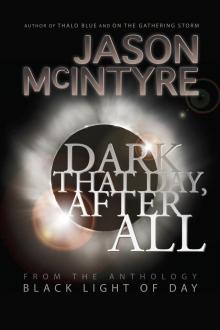 Dark That Day, After All
Dark That Day, After All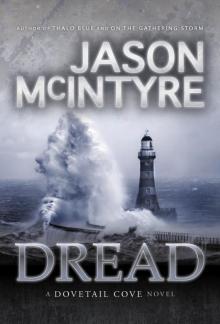 Dread
Dread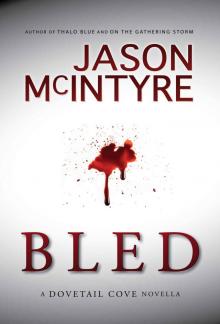 Bled
Bled Instead
Instead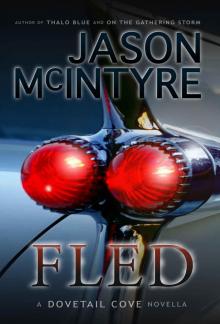 Fled
Fled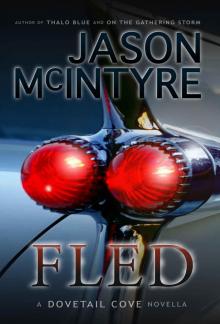 Fled (Dovetail Cove, 1973) (Dovetail Cove Series)
Fled (Dovetail Cove, 1973) (Dovetail Cove Series)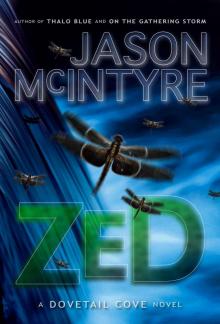 Zed
Zed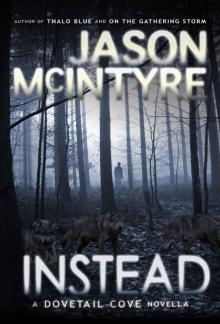 Instead (Dovetail Cove, 1979) (Dovetail Cove Series)
Instead (Dovetail Cove, 1979) (Dovetail Cove Series)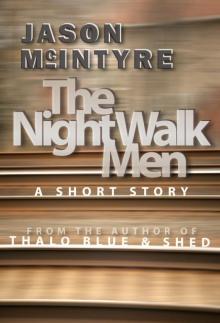 The Night Walk Men
The Night Walk Men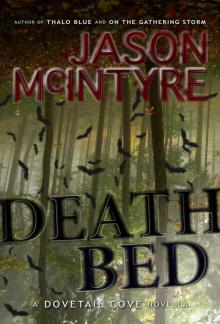 Deathbed (Dovetail Cove, 1971) (Dovetail Cove Series)
Deathbed (Dovetail Cove, 1971) (Dovetail Cove Series)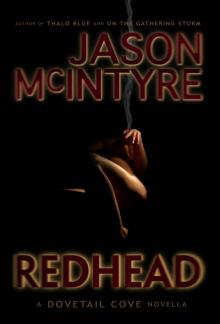 Redhead (Dovetail Cove, 1974) (Dovetail Cove Series)
Redhead (Dovetail Cove, 1974) (Dovetail Cove Series)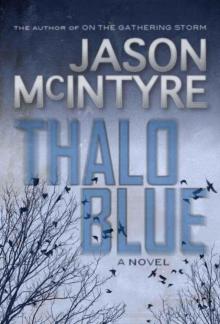 Thalo Blue
Thalo Blue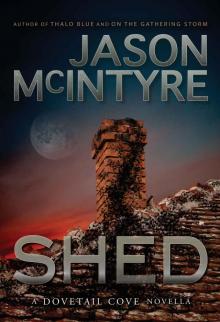 Shed
Shed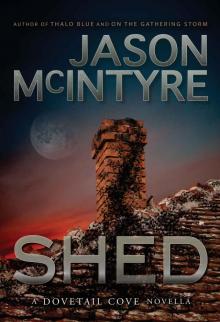 Shed (Dovetail Cove, 1977) (Dovetail Cove Series)
Shed (Dovetail Cove, 1977) (Dovetail Cove Series)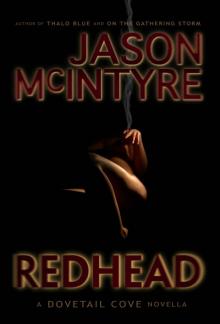 Redhead
Redhead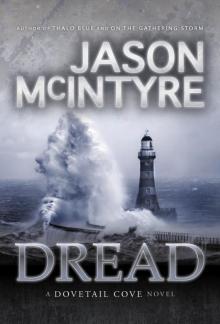 Dread (Dovetail Cove, 1978) (Dovetail Cove Series)
Dread (Dovetail Cove, 1978) (Dovetail Cove Series)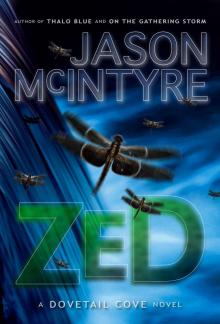 Zed (Dovetail Cove, 1975) (Dovetail Cove Series)
Zed (Dovetail Cove, 1975) (Dovetail Cove Series)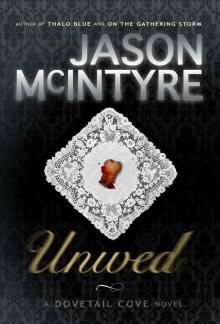 Unwed (Dovetail Cove, 1976) (Dovetail Cove Series)
Unwed (Dovetail Cove, 1976) (Dovetail Cove Series)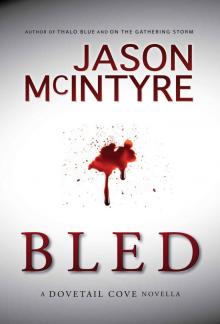 Bled (Dovetail Cove, 1972) (Dovetail Cove Series)
Bled (Dovetail Cove, 1972) (Dovetail Cove Series)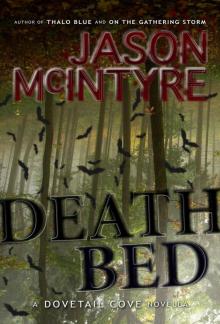 Deathbed
Deathbed